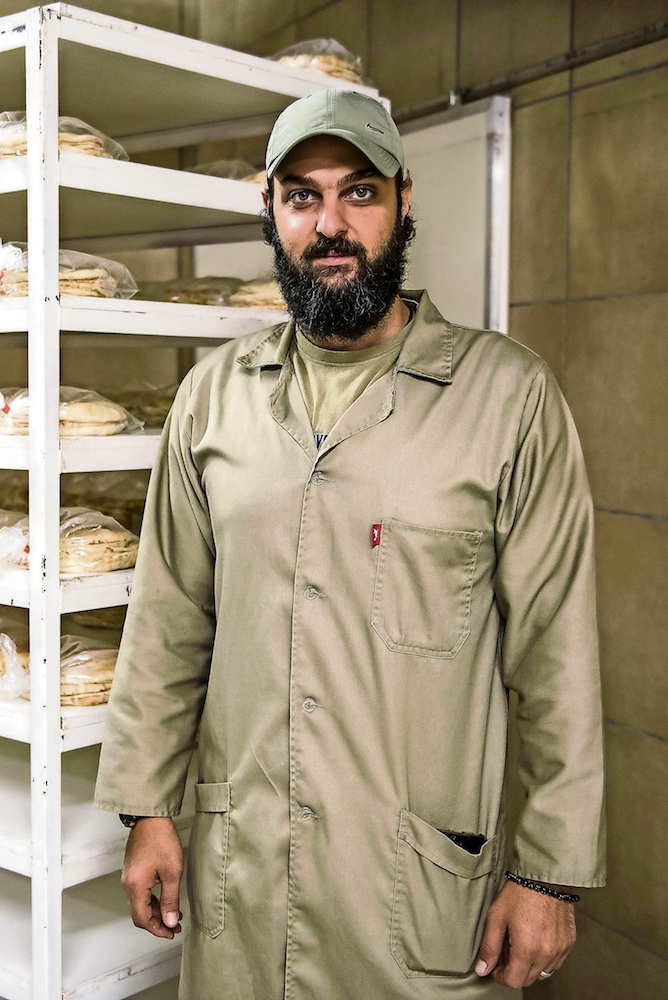Pita breads on the production line at Damas Bakery in Ormonde.
When Moroccan writer Mohamed Choukri called his 1973 autobiography For Bread Alone, he was commandeering the powerful symbolism of khubz (bread in Arabic) as a source of psychological as well as physical sustenance and comfort. “When I was seven or eight years old,” Choukri wrote, “I always dreamed about bread. And here I am at 16, still dreaming about it. Am I going to go on dreaming about bread forever?”
Throughout the Middle East, bread retains the power to evoke memories, history and identity. “Bread is thousands of years old,” says Damascus-born Ahmad Aladel of Damas Bakery. “It was the first food human beings made, as opposed to hunted. All the prophets have eaten bread. It’s the traditional food of the poor in my country – if you have no money, you can survive on bread.”
Last week, Aladel was presiding over a stall laden with pita breads, rusks and jewel-like pastries in Killarney Mall in Johannesburg, a temporary outpost of the Ormonde-based bakery (there’s another at the Melrose Arch Market).
The business was founded close to two years ago, after a departure from Syria triggered by what he tersely describes as “tough times”.
The family decision to settle in South Africa was deliberate; the decision to set up as bakers less so. “I’d visited here before,” says Almadel, who trained as an architect. “I’d met friendly people; the country is very beautiful, and I wasn’t scared by stories of crime – you’ll find more crime in the US than you’ll ever find here.”
But initially, the family was looking for another investment opportunity. “And then we saw there was a gap in the market. Most of the pita bread on sale here is much doughier than ours; you don’t see pita wraps such as we make at all. We felt we could offer something different and better.”
Almadel’s father is a doctor, another brother is also an architect, and that contributed to the enterprise the family set up. “We’re quite proud of the factory design: it looks really nice and is efficient. And the workers wear all that health-protection stuff my father, as a doctor, insists on.” The Ormonde bakery employs 25 people, and the state-of-the-art machinery can produce 5?000 pita breads an hour.
The modern technology, however, supports a highly traditional approach to product. “We use the traditional recipe, which is about 2?000 years old: natural bread; no chemicals. It’s far more filling and nourishing than supermarket bread.”
Almadel worries that damage to the environment is making it increasingly difficult to sustain traditional foods. “It took the world 10-billion years to form, and humans have burned up so much of the resources and environment in only the past 50 years. It may be that in another 50 years they won’t even be able to grow the nuts for my baklawa.”

Bread of life: Damascus-born Ahmad Aladel spotted a gap in the local market and opened a factory creating traditional Syrian pita bread. (Troy Enekvist, M&G)
Baklawa and the rest of the pastries came later for Damas. “It was clear that if we set up a stall with only bread, people wouldn’t stop. There was nothing to catch the eye. So we brought in chefs for the pastries.” Syrian pastries, Almadel explains, may look similar to Greek or Turkish cakes, “but we use less syrup – and some varieties are unique”.
There’s ma’amoul, a delicate shortbread stuffed with dates, and the uniquely Syrian barazik – sesame cookies. “There’s a legend that Jesus ate those,” he says.
Particularly beloved in Damascus are the rusks: crispy breadsticks flavoured with za’atar, aniseed or sesame, first sold six or seven hundred years ago, and traditionally eaten with milky tea.
The first breakthrough for the business was distribution through Spar stores. Damas now sends products to Cape Town and Durban, as well as selling across Gauteng. “We’d like to establish franchises,” says Almadel. “And our next hope is to create some Damas shawarma outlets, to showcase how special the bread is as a wrap for savoury foods …”
It’s clear as he talks that the feather-light bread, rather than the luscious pastries, is the core of the Damas enterprise. It’s also the strongest emotional link to home, whose devastated situation breaks Almadel’s heart. In Syria, he explains, bread was – and still is –subsidised to create a food safety net. “Even after four years of war Syrian bread, where it can still be sold, is the cheapest in the world.”
But now, in the words of the Washington Post, bread and wheat have become “weapons of war”: prices are manipulated, supplies blockaded, bakeries taken over or bombed.
Almadel mourns the lost cosmopolitan life of cities such as Damascus, where “everybody was together, every religion” with conversations in the bakery queue part of the ties that bound communities together.
“Damascus is 10?000 years old – the oldest city in the world. When I see what is happening now …” For a moment, he has to stop speaking. “Islam is a religion of love. The Prophet travelled widely, and he never told people to blow up monuments, churches or mosques.” Almadel gestures to the graceful columns depicted on the Damas label. “That’s Palmyra,” he says. “Now – it’s dust. Dust! I get goosebumps even saying it.”